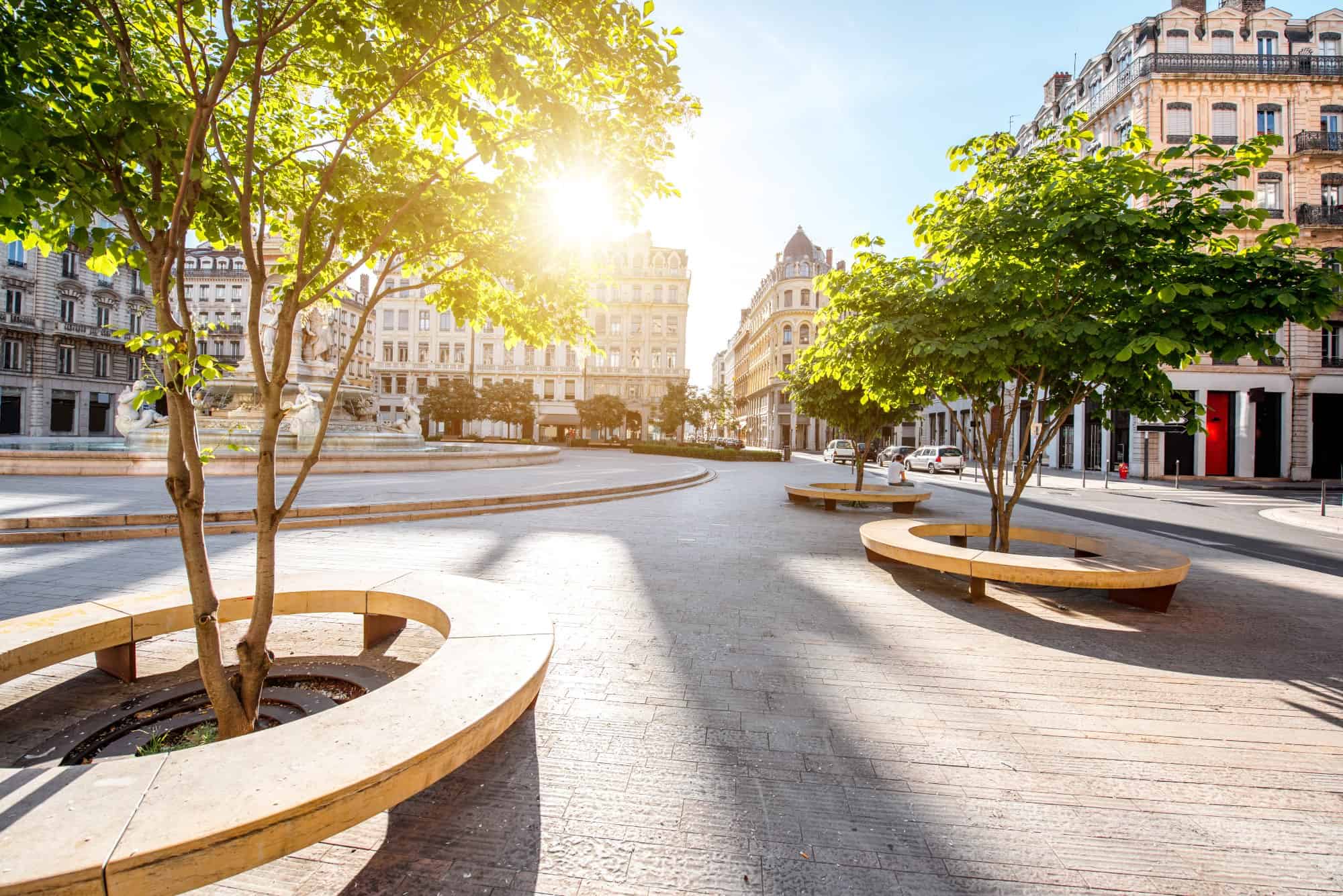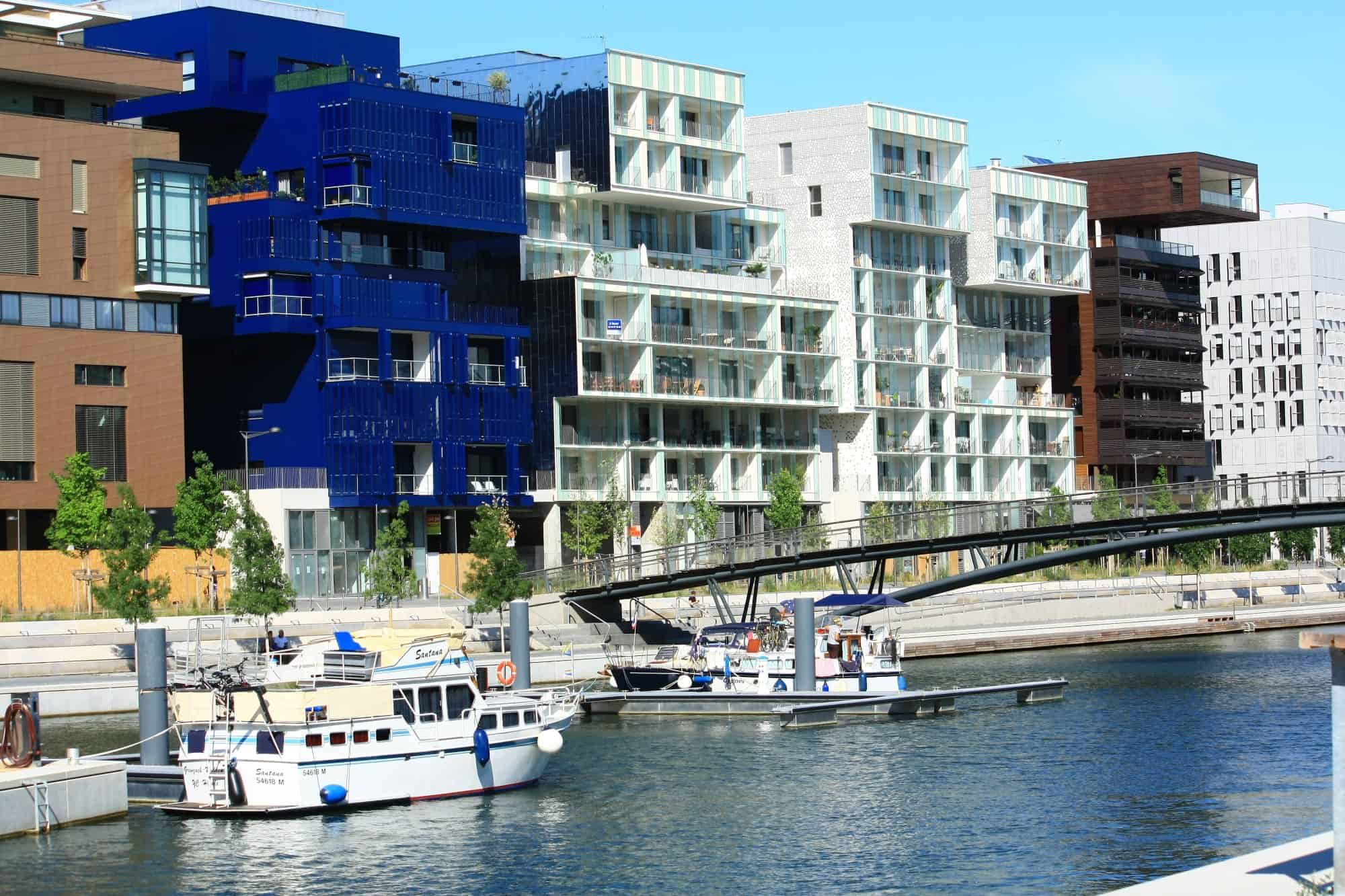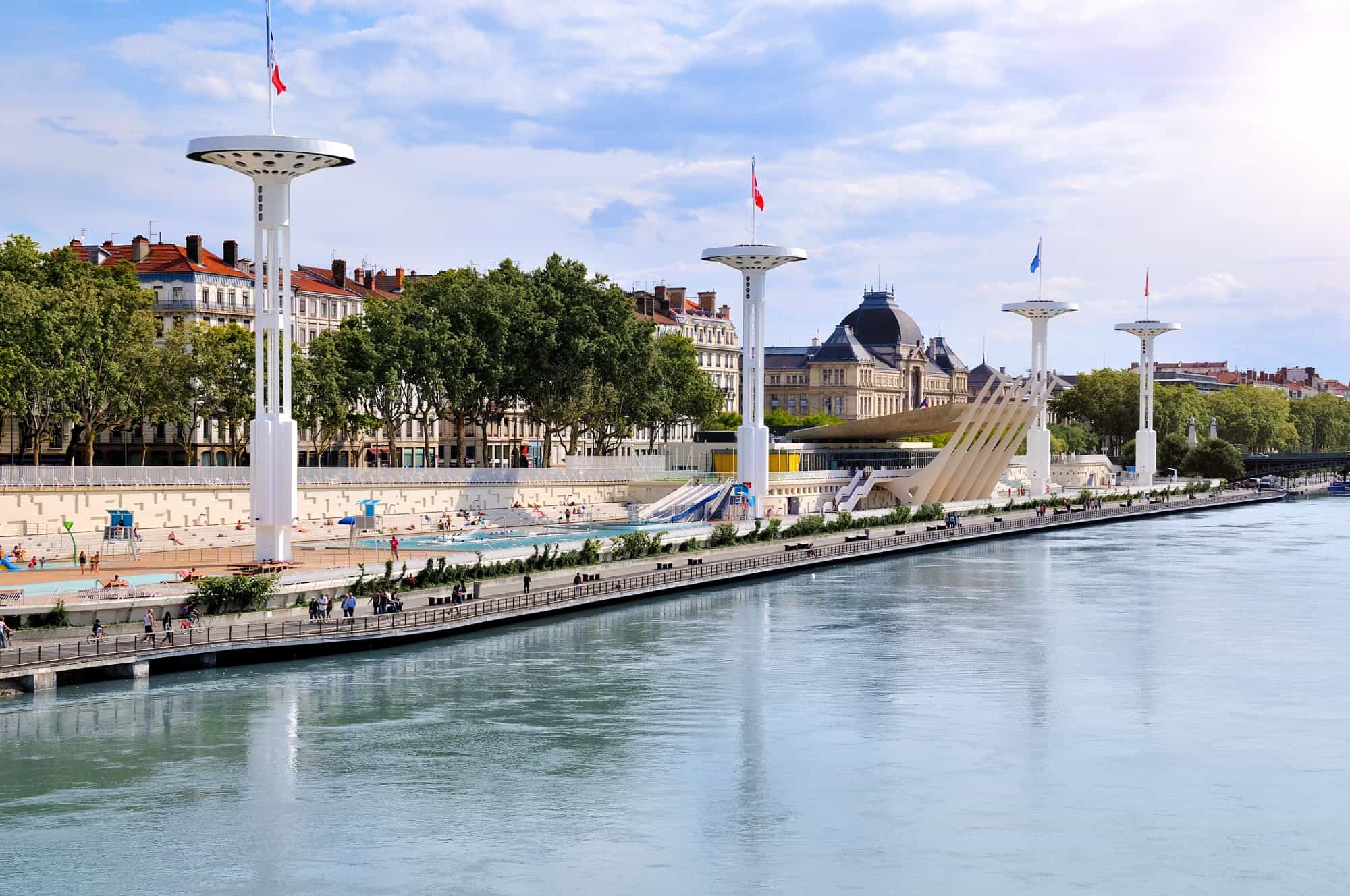Want to move to a French city but not interested in Paris? You aren't alone. The city of lights isn't for everyone (plus it's super expensive), which is why more and more expats are choosing Lyon over the French capital.
Lyon is more affordable, has some of the best restaurants in France, straddles two rivers, has one of the best in-city bike programs in Europe, and the historic district is truly stunning.
So, it's no surprise Lyon is home to many expatriates who want all the city amenities and a French lifestyle without the Parisian price tag. If your interest has been piqued, here's what you need to know to make Lyon your new home.
Secure Peace of Mind with Best-Value International Health Coverage
International Citizens Insurance provide free, no-obligation quotes from the leading international health insurance providers with plans tailored to meet your needs. Trusted by thousands of expats worldwide.
Lifestyle in Lyon
If you like city living, Lyon is arguably one of France's best places for expats.
Lyon is known for being a culturally entertaining, young, upbeat city. It's home to multiple reputable universities, which means the city is always full of young people keeping it busy all year round.

Thanks to its incredible restaurants, it also attracts many foodies and tourists to sample its cuisine.
Historically, the city was important. It sits on the meeting of two rivers, which give the city a real heart and a stunning old town that is a UNESCO heritage site.
With such a spectacular setting, overlooked by La Basilique Notre Dame de Fourvière, it's no surprise biking, walking, and jogging are popular. Being active along the river banks and in the many parks helps people burn off all the incredible food as well.
Lyon and the surrounding area are an economic powerhouse for France and Europe, so it is home to people from all over looking to work hard and relax in a city that doesn't have the pompousness of Paris.
Lyon is definitely an urban center, so if you plan to work, you'll have no problem finding a job.
Lyon is also ideally located to head further south to the French Riviera and enjoy the Mediterranean weather or head to the Alps in winter.
Many would say Lyon is the best city in France, and it's hard to argue with them. Good food, good fun, and variety are integral to life in Lyon.
It's a fun, thriving city that has flourished in recent years and invested well in cultural attractions and infrastructure, making life easy and enjoyable.
The cost of living in Lyon
Part of the reason Lyon is so popular is that it's as fun and exciting as Paris without the crazy costs. The difference between living costs between the two cities sits at around €1,000. For every €1,000 you have in Lyon, you'll need €2,000 to live in Paris.

Practically everything is just slightly cheaper in Lyon.
A beer will set you back €6 in Paris, €4 in Lyon. A coffee is €4 in Paris and only €3 in Lyon. Of course, standard groceries from major chain supermarkets don't vary much in price, so things like milk, eggs, pasta, etc., are reasonably standard across France, and it's easy to eat on a budget.
Like most major cities, Lyon has loads of open-air markets for fruit and vegetables as well as bakeries, fishmongers, and butchers, all of which offer exceptional quality at a reasonable price.
As a large French city, Lyon can provide for those on a budget and those looking to spend a bit more. Everything from gyms, bars, restaurants, and shops to doctors, schools, and internet access is freely available.
The average price for internet and a phone line sits at around €30 per month, and essential utility bills shouldn't cost over €180 per month.
Of course, the significant financial difference between Lyon and Paris is rent and property prices.
Lyon is much more reasonable. You can expect to pay €1500 a month for an unfurnished, decently-sized apartment in one of Lyon's best districts. If you sacrifice location and size, you can easily rent a good apartment for €900.
You can find more information on renting and how to do it in our guide, Renting A Property In France.
If you want to buy a house, a townhouse will set you back a minimum of €500,000, and prices go up from there.
Apartments are very common in Lyon, so you'll find prices more reasonable. A two-bed flat in the downtown area can be found for €200,000.
Considering buying a home in France? Read our Complete Guide To Buying A Property In France to avoid potential pitfalls and disappointment.
Where to live in Lyon
Let’s take a closer look at the various neighborhoods in Lyon and the surrounding suburbs that are most popular with expats, and discover why each area is so highly regarded.

Lyon's best neighborhoods
1. Presqu'île
The heart of Lyon’s action with trendy shops, restaurants, and nightlife. Perfect, if you want to be in the center of the city’s busy and active life.
- Average Rent (2-bed apartment): €1,300 - €1,800 per month
- Average Purchase Price (2-bed apartment): €6,000 - €7,500 per m²
2. Croix-Rousse
Known for its artistic and bohemian atmosphere, this area is filled with street art, local markets, and a strong sense of community. Great for creative personalities seeking a lively, cultural vibe.
- Average Rent (2-bed apartment): €1,200 - €1,600 per month
- Average Purchase Price (2-bed apartment): €5,500 - €7,000 per m²
3. Vieux Lyon
A historic neighborhood with cobblestone streets and Renaissance architecture. Ideal if you love history and enjoy a scenic, charming environment while still being close to the city center.
- Average Rent (2-bed apartment): €1,000 - €1,500 per month
- Average Purchase Price (2-bed apartment): €5,500 - €6,500 per m²
4. Tête d'Or (6th Arrondissement)
Located near Parc de la Tête d’Or, this neighborhood is perfect for families and outdoor lovers. The area offers peaceful green spaces, top-notch schools, and a safe, upscale environment.
- Average Rent (2-bed apartment): €1,500 - €2,000 per month
- Average Purchase Price (2-bed apartment): €7,000 - €9,000 per m²
5. Monplaisir
A residential area that has a village-like atmosphere with a strong community feel. There are plenty of local shops, good schools, and parks, making it perfect for families.
- Average Rent (2-bed apartment): €1,000 - €1,400 per month
- Average Purchase Price (2-bed apartment): €4,500 - €6,000 per m²
6. Confluence
A modern and up-and-coming district with sleek architecture, shopping centers, and a marina. It’s great for expats who prefer contemporary living and being near business hubs.
- Average Rent (2-bed apartment): €1,300 - €1,700 per month
- Average Purchase Price (2-bed apartment): €6,000 - €7,500 per m²
7. Part-Dieu
This business district is the city’s transportation hub, ideal for expats working in Lyon or commuting to other cities. It’s full of conveniences with access to large malls and transport connections.
- Average Rent (2-bed apartment): €1,200 - €1,600 per month
- Average Purchase Price (2-bed apartment): €5,000 - €6,500 per m²
8. Gerland
Located in the southern part of Lyon, Gerland is a growing area with good schools, modern apartments, and proximity to biotech and research companies. It's great for professionals and families alike.
- Average Rent (2-bed apartment): €1,000 - €1,400 per month
- Average Purchase Price (2-bed apartment): €4,500 - €6,000 per m²
9. Villeurbanne
Just outside the city center, Villeurbanne offers affordable living with excellent metro links to Lyon. It’s a popular choice for students and younger expats who want affordable housing options.
- Average Rent (2-bed apartment): €900 - €1,300 per month
- Average Purchase Price (2-bed apartment): €4,000 - €5,500 per m²
10. Saint-Just
A quiet, residential area on the hills of Fourvière with beautiful views of the city. Ideal for those looking for a peaceful, suburban feel while still being close to central Lyon.
- Average Rent (2-bed apartment): €1,000 - €1,500 per month
- Average Purchase Price (2-bed apartment): €5,000 - €6,500 per m²
Lyon's popular suburbs
Moving out of the city itself, here are a few suburbs around Lyon that offer a suburban lifestyle with easy access to the city center:
1. Écully
Écully is a green and affluent suburb known for its quiet, upscale environment and proximity to good schools and universities like EMLYON Business School.
- Transport connection: Direct access to Lyon via bus lines and the A6 motorway. The commute to the city center by public transport takes around 20–30 minutes.
- Average Rent (2-bed apartment): €1,100 - €1,500 per month
- Average Purchase Price (2-bed apartment): €4,500 - €6,000 per m²
2. Sainte-Foy-lès-Lyon
A charming hillside town with stunning views of Lyon, offering peaceful surroundings, parks, and a strong community feel. It's an ideal spot for families or nature lovers.
- Transport connection: Regular bus services (TCL buses) connect Sainte-Foy-lès-Lyon to Lyon’s city center in around 20 minutes.
- Average Rent (2-bed apartment): €1,000 - €1,400 per month
- Average Purchase Price (2-bed apartment): €4,000 - €5,500 per m²
3. Tassin-la-Demi-Lune
Tassin offers a suburban atmosphere with spacious homes, green spaces, and a relaxed pace of life. It’s close enough to Lyon for convenience but far enough for a quieter lifestyle.
- Transport connection: Several bus lines and the TER (regional train) provide a direct route into Lyon, with the city center reachable in about 15–20 minutes.
- Average Rent (2-bed apartment): €1,000 - €1,400 per month
- Average Purchase Price (2-bed apartment): €4,500 - €6,000 per m²
4. Caluire-et-Cuire
This suburb is close to the Parc de la Tête d'Or and offers a great balance between nature and proximity to Lyon. It’s quiet and residential, ideal for families who enjoy outdoor activities.
- Transport connection: Served by bus routes and metro line C, it’s only a 10–15 minute ride to the center of Lyon.
- Average Rent (2-bed apartment): €1,000 - €1,300 per month
- Average Purchase Price (2-bed apartment): €4,500 - €6,500 per m²
5. Craponne
A peaceful, family-friendly suburb with a village-like atmosphere. Craponne has local markets, shops, and plenty of green areas, making it appealing to those seeking a slower pace of life.
- Transport connection: Bus lines connect Craponne to Lyon, with travel times to the city center ranging from 20–30 minutes.
- Average Rent (2-bed apartment): €900 - €1,300 per month
- Average Purchase Price (2-bed apartment): €3,500 - €5,000 per m²
6. Francheville
A residential area with a mix of modern and traditional housing, Francheville offers great amenities, schools, and a peaceful environment, ideal for both families and retirees.
- Transport connection: Well connected by bus and TER trains, with a commute time of around 20 minutes to the city center.
- Average Rent (2-bed apartment): €900 - €1,200 per month
- Average Purchase Price (2-bed apartment): €3,800 - €5,200 per m²
7. Saint-Didier-au-Mont-d'Or
Known for its beautiful homes and scenic landscapes, this is a more exclusive suburb offering a luxurious, peaceful lifestyle. It’s great for those seeking privacy and a countryside feel.
- Transport connection: Bus services and proximity to Lyon-Vaise station (TER train) make the commute to the city center about 25 minutes.
- Average Rent (2-bed apartment): €1,200 - €1,700 per month
- Average Purchase Price (2-bed apartment): €5,500 - €7,000 per m²
Each of these suburbs offers a slower, suburban pace of life while still being close enough to Lyon for work, shopping, and cultural activities, with convenient transport links to the city center.
Healthcare in Lyon
Healthcare facilities in Lyon are modern, and the system is well-developed. To have access to public services, you need to register in an appropriate department. Here is the step-by-step action plan:
Step 1: Apply for a residency permit (Titre de Séjour)
To access the French healthcare system (PUMA - Protection Universelle Maladie), you must have legal residency status in France.
How:
- After arriving in France, apply for your Carte de Séjour or validate your long-stay visa online. This can usually be done through the OFII website, where you'll also be required to attend a medical examination and pay a residence tax.
- Once validated, you can officially start the healthcare registration process.
Step 2: Register for French healthcare (CPAM)
To access public healthcare, you need to register with the Caisse Primaire d’Assurance Maladie (CPAM), which administers the French health insurance system.
How:
- Gather the following documents:
- A completed Cerfa form (S1106 form) to apply for health insurance.
- A copy of your passport and visa/residence permit.
- Proof of address in France (utility bill, rental contract).
- Birth certificate (translated into French if necessary).
- A RIB (Relevé d’Identité Bancaire) for direct reimbursements to your French bank account.
- Submit these documents either by mail or in person at your local CPAM office. In Lyon, the main CPAM office is located at 21 Rue de la Villette, near the Part-Dieu district.
Step 3: Obtain your Social Security Number
Once registered, you'll receive a temporary social security number, which allows you to start using the healthcare system while your application is processed.
How: After submitting your application, CPAM will send you a temporary number (called Numéro de Sécurité Sociale) by mail. The permanent number will follow after the processing is complete, which can take a few months.
Step 4: Create an account on Ameli.fr
Ameli.fr is the online platform for the French healthcare system. Through your account, you can track your reimbursements, download forms, and update personal information.
- How: After you receive your social security number, create an account on the Ameli website by following the registration process and linking your CPAM information. This will allow you to manage your healthcare online.
Step 5: Receive your Carte Vitale
The Carte Vitale is your health insurance card that you'll present when visiting doctors or medical facilities. It ensures that you’re reimbursed for medical services.
How: Once your registration is finalized, you’ll receive a request form to send a passport-sized photo and a copy of your ID to the CPAM office. After processing, your Carte Vitale will be sent to your address.
Timeline: It can take several months to receive your physical Carte Vitale, but you can still receive healthcare services with your temporary social security number and request reimbursement using paper forms (called feuilles de soins) during this time.
Step 6: Choose a general practitioner (médecin traitant)
In the French healthcare system, having a registered general practitioner (médecin traitant) is essential. They will be your primary point of contact for medical issues and can refer you to specialists when needed.
- How:
- Find a general practitioner near your home (you can search online or ask for recommendations).
- Register them as your médecin traitant by filling out the Déclaration de Médecin Traitant form, which you and the doctor sign during your first consultation.
- Submit the form to CPAM (you can do this online via your Ameli account or mail it to the local CPAM office).
Step 7: Supplement your coverage with private insurance (Mutuelle)
While French public healthcare reimburses around 70% of medical costs, you’ll need private health insurance (mutuelle) to cover the rest.
How:
- Research and choose a mutuelle provider. Many expats opt for international providers that cover a wide range of services, including dental and optical care.
- Once enrolled, your mutuelle will complement your public healthcare by covering the additional costs not reimbursed by CPAM.
Key addresses & contacts in Lyon:
- Main CPAM Office in Lyon:
- Address: 21 Rue de la Villette, 69003 Lyon
- Phone: 36 46 (within France)
- Website: ameli.fr
- OFII Office for Visa Validation:
- Address: 7 rue Quivogne, 69002 Lyon
- Phone: 04 78 62 52 74
Read our Healthcare In France For Expats guide for details and how to do it.
Private & international health insurance
If you are not a permanent resident yet, you will need private health insurance, either local or international. To make sure you get the best value for money, compare international health insurance options from various providers to find the best deal.
Things to do in Lyon
Lyon is a city that seems to have perfected the art of living well. Here, you will find stunning rivers, a world-famous food scene, and proximity to some of the most beautiful natural landscapes in France.
Relax in Parc de la Tête d’Or
Lyon boasts the largest urban park in France, Parc de la Tête d’Or, a 117-hectare oasis perfect for escaping the city buzz. You can go jogging, boating on the lake, visit the zoo, or just lounge with a book; this park is a local treasure that offers something for everyone.
Stroll around Vieux Lyon
Lyon’s Vieux Lyon is one of the largest Renaissance districts in Europe, a maze of cobblestone streets, medieval architecture, and those famous traboules—secret passageways once used by silk merchants. It's also full of lively cafes, great wine bars, and charming boutiques.
Enjoy your food
If you’re serious about food, Lyon is your mecca. This city has earned its title as the capital of gastronomy, and it’s no joke. From classic bouchons serving hearty Lyonnaise cuisine to high-end Michelin-starred restaurants, the food here is simply unmatched.
...and festivals
Lyon loves a good festival, and none is bigger than the Fête des Lumières, which transforms the city into a glowing wonderland each December. For something a bit more musical, Nuits de Fourvière is a summer festival held in the Roman amphitheater, combining music, theater, and film in one of the most breathtaking settings you can imagine.
Explore the countryside
Lyon’s location is unbeatable. Fancy a wine tour? Head to Beaujolais. Need a weekend by the water? Lake Annecy is a short drive away, offering crystal-clear waters and mountain views. If hiking’s your thing, the volcanic landscapes of Puy de Dôme are perfect for a day of outdoor adventure.
Travel further
Lyon is smack in the middle of everything. Two hours to Paris by TGV, a couple of hours to the Alps for skiing, and quick access to the Mediterranean coast. Not to mention, Lyon’s airport offers direct flights to major cities across Europe, so spontaneous weekend trips are always an option.
Things to know before you go
There are so many things in Lyon that make living in this city something special. Here are just some of them.
1. Food is a big thing in Lyon
The city is the capital of gastronomy in France and is home to over 2,000 restaurants with some incredible chefs. If you're a foodie, start at the Les Halle de Lyon or anything that says "Bouchon". These restaurants form part of the soul of Lyon.
2. Look up!
Lyon has literally thousands of buildings painted so intricately that you may not notice them at first glance. That man leaning out the window and shaking a tablecloth? Potentially painted on, it's off-putting, to begin with, but it makes walking around the city fun.
4. Start googling French celebrities
Lyon is the home of French cinema, so it celebrates by inviting French movie stars to screenings across the city every year. It's worth knowing who's who.
5. You don't need a car
Lyon's public transport is excellent, with a great metro, good buses, and a fantastic bike-hire system. In the busy summer months, it's probably cheaper, easier, and faster to take public transport and not drive.
6. Controversial architecture
Some of the buildings can cause arguments. Two in particular, The Euro News Headquarters and the Musée des Confluences, are architecturally significant, and some people love them, some people hate them. Be careful bringing up this subject over drinks.
7. The significance of the Tête d'Or Park
Life in Lyon doesn't get much better than sipping chilled wine and eating takeaway food in the Tête d'Or Park. To understand what the city feels like, grab a blanket and sit on the grass, and you'll learn everything you need to know about Lyon.
Expats in Lyon
Thanks to its amazing job opportunities, cultural heritage, good food, and good connections, Lyon has become a destination of choice for many expats moving to France. The city is a good alternative to living in Paris for those who love city life but prefer a more affordable environment.
Lyon is also one of the best places to live in France if you are after an urban retirement.
Expats here live side by side with the locals, students, and international students. The result is a melting pot of culture, language, and people, making life here easy.
Unlike other areas of France, where expats can form tight groups and never fully integrate with the French, Lyon is a real mix.
You can find an Expats living in Lyon Facebook group or search the many forums for English-speaking people living or studying in Lyon.
Some people form groups of expats, but you're just as likely to make French friends in your local café, museum, or bookstore.
Interestingly, expats in Lyon tend to cross cultures and borders. Most groups of expats include Brits, Spanish, Americans, Australians, Finnish, and more.
Everyone speaks English, so your local expat yoga class will probably be in English, but you'll find all nationalities there. Many expats love meeting friends from all over the world in Lyon, so the population is growing hugely. Let's just say you'll never be lonely in Lyon.
Final thoughts on living in Lyon
If you're looking to live in a French city and don't want to pay the price of Paris, Lyon should undoubtedly be on your list.

Lyon's old town is stunning, and the architecture, river, hill, and painted buildings make it one of France's more beautiful cities. Culturally and historically, it has a lot going for it, with plenty of tourist attractions, restaurants, and things to do.
Lyon is already home to plenty of expats, so if you decide to join their ranks, you certainly won't be alone.
People from all over the world settled in Lyon and created a wonderfully diverse community. Lyon is packed, busy, and thriving. There are plenty of work opportunities, making it ideal for people who still want to earn.
If you haven't already been to Lyon, it's worth planning a trip. As we mentioned above, grab a bottle of wine and a blanket and head to the Tête d'Or Park on a sunny day to get a feel for the city; don't blame us if you never want to leave!
Other popular expat destinations in France to consider:
- Living In Vannes, France As An Expat: The Pros And Cons
- Discover What It’s Like Living In Toulouse As An Expat
- Living In Montpellier, France
- What’s It Like Living In Nice, France, As An Expat
- Living In Bordeaux – The Expats’ Guide
You might find helpful:
- Living In France Guide – everything you need to know to plan your move and settle down in France
- The Best Places to Live in France – a detailed overview of France’s most popular locations for expats.
- Opening A Bank Account In France As An Expat
- Healthcare In France For Expats
- Understanding International Health Insurance: A Comprehensive Guide
- Haven't found what you were looking for? Comment below with your question, and we'll do our best to help.
Secure Peace of Mind with Best-Value International Health Coverage
International Citizens Insurance provide free, no-obligation quotes from the leading international health insurance providers with plans tailored to meet your needs. Trusted by thousands of expats worldwide.









